|
|
|
Sort Order |
|
|
|
Items / Page
|
|
|
|
|
|
|
| Srl | Item |
| 1 |
ID:
124482


|
|
|
|
|
| Publication |
2013.
|
| Summary/Abstract |
This article explores the political subjectivity of Kurdish children in urban Turkey. Often referred to as "stone-throwing children," since the early 2000s Kurdish children have entered Turkish public discourse as central political actors of the urban Kurdish movement. I suggest that the politicization of children can be understood in the context of transformations in age and kinship systems within the Kurdish community that were shaped by the forced migration of Kurds in the early 1990s. Focusing on the experiences of Kurdish children in the city of Adana, I argue that memories of violence transmitted by displaced parents, combined with the children's experiences of urban life, including exclusion, discrimination, poverty, and state violence, necessitate a reevaluation of how childhood is conceived and experienced within the Kurdish community. In a context where Kurdish adults often have trouble integrating into the urban context, their children frequently challenge conventional power relations within their families as well as within the Kurdish movement. In contrast to a dominant Turkish public discourse positing that these children are being abused by politicized adults, I contend that Kurdish children are active agents who subvert the agendas and norms of not only Turkish but also Kurdish politics. The article analyzes the ways Kurdish children are represented in the public discourse, how they narrate and make sense of their own politicization, and the relationship between the memory and the postmemory of violence in the context of their mobilization.
|
|
|
|
|
|
|
|
|
|
|
|
|
|
|
|
| 2 |
ID:
109463
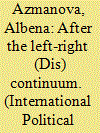

|
|
|
|
|
| Publication |
2011.
|
| Summary/Abstract |
This article examines the status of globalization as a causal factor in political mobilization and proposes a research agenda for diagnosing the impact of global socio-economic dynamics on ideological orientation in national polities. Focusing on Europe's established democracies, the article outlines recent shifts in Europe's ideological landscape and explores the mechanisms generating a new pattern of political conflict and electoral competition. It advances the hypothesis that the knowledge economy of open borders has brought about a political cleavage intimately linked to citizens' perceptions of the social impact of global economic integration. In this context, the polarization of life chances is determined by institutionally mediated exposure to both the economic opportunities and the hazards of globalization. Fostered by the increasing relevance of the international for state-bound publics, new fault-lines of social conflict are emerging, giving shape to a new, "opportunity-risk," axis of political competition. As the novel political cleavage challenges the conventional left-right divide, it is likely to radically alter Europe's ideological geography.
|
|
|
|
|
|
|
|
|
|
|
|
|
|
|
|
| 3 |
ID:
119980
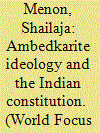

|
|
|
| 4 |
ID:
132143
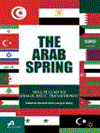

|
|
|
|
|
| Publication |
New York, Palgrave Macmillan, 2012.
|
| Description |
317p.Pbk
|
| Standard Number |
9781137344038
|
|
|
|
|
|
|
|
|
|
|
|
Copies: C:1/I:0,R:0,Q:0
Circulation
| Accession# | Call# | Current Location | Status | Policy | Location |
| 057828 | 320/HEN 057828 | Main | On Shelf | General | |
|
|
|
|
| 5 |
ID:
128070
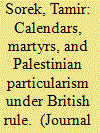

|
|
|
|
|
| Publication |
2014.
|
| Summary/Abstract |
This article explores how political calendars and shared martyrology provided
important markers of identity and symbolic tools for political mobilization in
Mandate Palestine. The dates on the emerging Palestinian calendar grew out of
the politicization and nationalization of traditional holy days, as well as the
commemoration of politically significant events of the period, including those
involving local Palestinian martyrs.
|
|
|
|
|
|
|
|
|
|
|
|
|
|
|
|
| 6 |
ID:
115826


|
|
|
|
|
| Publication |
2012.
|
| Summary/Abstract |
This article explores political mobilization, legitimacy, and identity in the Angolan Central Highlands from the anti-colonial struggle of the 1960s until the end of the civil war in 2002. It examines how the rival movements, MPLA and UNITA, competed for support, and considers the nature of the relationships between political-military elites and the Angolan people. Whereas much scholarship on civil war has focused on the emergence of rebellions against the state, I argue that such an approach to the Angolan war is inappropriate since both protagonists were founded as anti-colonial movements and both organizations developed characteristics of states to different degrees. Central to each party's narrative was an ideology of the state as a complex of ideas and practices that linked together responsibilities towards the population, prerogatives of violence, and the identity of the nation. People expressed support for either or both movements in terms of common interest and identity, which in turn were shaped by the political education of the movement in control at the time.
|
|
|
|
|
|
|
|
|
|
|
|
|
|
|
|
| 7 |
ID:
133105
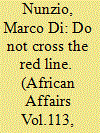

|
|
|
|
|
| Publication |
2014.
|
| Summary/Abstract |
Only five years after it lost a national election in Addis Ababa, the overwhelming victory of the Ethiopian People's Revolutionary Democratic Front (EPRDF) in the 2010 general elections marked the defeat of the opposition parties and the return to a dominant-party state. The capacity of the EPRDF to mobilize people in towns and the capital city triggered debates on the nature of consent in urban Ethiopia. This article contributes to this debate in two ways. First, it maps the specific institutions and strategies the ruling party has used to close political space in the capital since 2005, explaining how it has tied political mobilization to the delivery of services to those at the bottom of urban society. Second, it examines interactions between the ruling party and young people involved in government development programmes and youth organizations, demonstrating the subtle ways dissent is expressed even as EPRDF power is reproduced. In this regard, the victory of the ruling party in 2010 does not bear witness to the neutralization of dissent. Rather, it reveals a reshaping of the way the government has governed and controlled the city since the late 1990s.
|
|
|
|
|
|
|
|
|
|
|
|
|
|
|
|
| 8 |
ID:
131950


|
|
|
|
|
| Publication |
2014.
|
| Summary/Abstract |
In a novel approach to studying political mobilization among ethnic Tibetans in China, this article addresses two key questions. First, considering the Chinese state's repressive policies towards Tibetan Buddhism, what role does religion play in fomenting Tibetan political resistance? Second, what implications can be drawn from the changing ethnic demography in Tibet about the conflict behaviour of Tibetans? Using various GIS-referenced data, this article specifically examines the 2008 Tibetan protest movements in China. The main results of our analysis indicate that the spread and frequency of protests in ethnic Tibetan areas are significantly associated with the number of officially registered Tibetan Buddhist sites, as well as the historical dominance of particular types of Tibetan religious sects. Furthermore, our analysis shows that the effect of Han Chinese settlement on Tibetan political activism is more controversial than previously though
|
|
|
|
|
|
|
|
|
|
|
|
|
|
|
|
| 9 |
ID:
100428
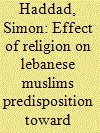

|
|
|
| 10 |
ID:
124480
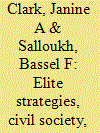

|
|
|
|
|
| Publication |
2013.
|
| Summary/Abstract |
This article explains the endurance of sectarian identities and modes of political mobilization in Lebanon after the civil war. This is done by examining three case studies that demonstrate a recursive relation between sectarian elites and civil society actors: on one side of this relation, sectarian elites pursue their political and socioeconomic interests at the expense of civil society organizations (CSOs); on the other side, civil society actors instrumentalize the sectarian political system and its resources to advance their own organizational or personal advantage. These mutually reinforcing dynamics enable sectarian elites to penetrate, besiege, or co-opt CSOs as well as to extend their clientelist networks to CSOs that should otherwise lead the effort to establish cross-sectarian ties and modes of political mobilization or that expressly seek to challenge the sectarian system. The article fills a gap in the literature on sectarianism in postwar Lebanon and helps explain a puzzle identified by Ashutosh Varshney in the theoretical debate on ethnic conflict, namely the reasons behind the "stickiness" of historically constructed ethnic identities
|
|
|
|
|
|
|
|
|
|
|
|
|
|
|
|
| 11 |
ID:
090711
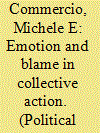

|
|
|
|
|
| Publication |
2009.
|
| Summary/Abstract |
Michele E. Commercio discusses Russian political mobilization in post-Soviet Kyrgyzstan and Latvia. She concludes that contentious voice is more likely to emerge when dissatisfied groups have an unambiguous source of blame for their grievances, while amicable voice is more likely to emerge when such groups lack an obvious target of blame.
|
|
|
|
|
|
|
|
|
|
|
|
|
|
|
|
| 12 |
ID:
151408
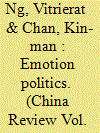

|
|
|
|
|
| Summary/Abstract |
This study explores the role of emotion in political mobilization by
studying People Power, a radical group in Hong Kong. Th e group abandoned
their disruptive approach and adopted a new tactic of social
movement—joyous resistance—which attracted large numbers of participants
and thus became a powerful political force exerting great pressure
on the government. Th is case shows that festive emotion can be an intangible
resource that reduces the cost of participation compared with
confrontational tactics. Th e cathartic function of joyous resistance also
reduces the potential for violence during mobilization. After the
Umbrella Movement, there has been debate on whether more confrontational
or even violent tactics should be adopted in social movements.
Th e idea of joyous resistance will remain an important option for social
movement organizers considering the sustainability of mobilization in a
moderate society such as Hong Kong.
|
|
|
|
|
|
|
|
|
|
|
|
|
|
|
|
| 13 |
ID:
121089
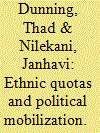

|
|
|
|
|
| Publication |
2013.
|
| Summary/Abstract |
Ethnic quotas are often expected to induce distribution of material benefits to members of disadvantaged groups. Yet, the presence of an ethnic quota does not imply that political mobilization takes place along ethnic lines: Cross-cutting affiliations within multi-ethnic party organizations may lessen the tendency of politicians to target benefits to particular ethnic groups. In this article, we evaluate the impact of quotas for the presidencies of village councils in India, a subject of considerable recent research. Drawing on fine-grained information from surveys of voters, council members, presidents, and bureaucrats and using a natural experiment to isolate the effects of quotas in the states of Karnataka, Rajasthan, and Bihar, we find weak distributive effects of quotas for marginalized castes and tribes, but suggestive evidence of the importance of partisanship. We then use survey experiments to compare the influence of party and caste on voting preferences and expectations of benefit receipt. Our results suggest that especially when politicians have dynamic political incentives to allocate benefits along party lines, cross-cutting partisan ties can blunt the distributive impact of ethnic quotas.
|
|
|
|
|
|
|
|
|
|
|
|
|
|
|
|
| 14 |
ID:
130094
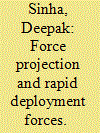

|
|
|
|
|
| Publication |
2014.
|
| Summary/Abstract |
As India's regional and global aspirations grow with its increasing economic clout, it will be forced to build up its capacity to project power in its national interest to ensure that the region is not destabilized by outside elements that may be inimical to it. The establishment of an effective and responsive RDF towards this end is inescapable. To be able to do so requires that India take a long hard look at its requirements and reassess its capabilities. It needs to quickly put in place structures that will ensure that its RDF is able to provide what is required at it so that in the words at Rahul Gandhi, "We stop being scared about how the world will impact us, and we step out and worry about how we will impact the world."
|
|
|
|
|
|
|
|
|
|
|
|
|
|
|
|
| 15 |
ID:
133110


|
|
|
|
|
| Publication |
2014.
|
| Summary/Abstract |
The impacts of recent food, financial, and energy crises have reinvigorated a geopolitical enframing of global food security that makes foreign development assistance a primary component of national security strategies. This centres elite fears of hunger and underdevelopment and strongly shapes policies and strategies adopted in response. Geopolitical fears of hungry and food insecure populations are compounded by the politics of austerity and cuts to foreign aid budgets and social spending. This paper examines the geopolitics of food security, fear, and austerity as expressed in the rhetoric and strategies of major aid donor governments, especially the US and UK, and proposes an alternative geopolitics that builds from the affective dimensions of hunger, food insecurity, and vulnerability as experienced by the hungry and poor. The example of farmer suicides and agrarian political mobilisation in India demonstrates how this affective alternative geopolitics may be constructed and examined.
|
|
|
|
|
|
|
|
|
|
|
|
|
|
|
|
| 16 |
ID:
139013


|
|
|
|
|
| Summary/Abstract |
Spain and the United Kingdom have experienced similar types of political violence. Since the 1960s, both countries have suffered casualties as a result of long-standing ethno-nationalist conflicts as well as terrorist attacks by Al Qaeda–inspired groups. In spite of these similarities, the two countries display a striking variation in the attitudes to victims. In Spain, Associations of Victims of Terrorism have been highly visible and influential, whereas United Kingdom-based organizations have not captured the public's imagination and the attention of policymakers in the same way. Spanish associations of victims have been present in the public sphere and have routinely provided their opinions on counterterrorist policy and appropriate government legislation whereas this sort of political activity is difficult to trace in the United Kingdom. As a result of this puzzle, the article tries to answer the following question: Why are associations of victims of terrorism by Al Qaeda–inspired attacks more influential in Spain than in the United Kingdom? The article will argue that political and sociocultural variables account for the difference. More specifically, the article demonstrates that the experience of both ethno-nationalist and jihadist political violence has affected party systems and cultural frames differently, hence providing distinct sets of political opportunities for victims’ associations to carry out their lobbying strategies.
|
|
|
|
|
|
|
|
|
|
|
|
|
|
|
|
| 17 |
ID:
128141
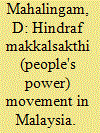

|
|
|
|
|
| Publication |
2014.
|
| Summary/Abstract |
HINDRAF, the Hindu rights advocacy group spearheaded and organized the Indian spring on November 24, 2007 on the eve of golden jubilee year of Malaysia's independence and confronted the Malaysian state in a bid to highlight the predicament of the Indian ethnic minority. The political mobilization was popularly known as HINDRAF Makalsakthi movement as a huge numbers of Indian belonging to different strata overwhelmingly participated - even thought there was threat and intimidation from the ruling establishments against participation to vent out their anger.
|
|
|
|
|
|
|
|
|
|
|
|
|
|
|
|
| 18 |
ID:
192843
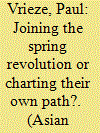

|
|
|
|
|
| Summary/Abstract |
This article examines Myanmar ethnic minorities’ diverse responses to the 2021 military coup. The coup prompted widespread mobilization for a national alliance that aims to replace the junta with a federal democracy. For minority actors this resistance could offer a unique opportunity to advance their demands for political autonomy, yet their responses diverged. Some joined the alliance; others declined, or accepted junta offers. Based on original interviews, this analysis unpacks the positions of ethnic rebels, civil society organizations, and parties. It suggests rebels’ strategies were influenced by their relations with civil society and military strength. Most ethnic parties avoided resistance, as they feared junta retaliation and distrusted the ousted National League for Democracy. Ethnic civil society organizations played a key coordinating role during alliance formation, enabled by its campaign experience and networks. The article’s insights into interethnic cooperation and minorities’ varied situations can benefit international actors seeking resolutions of Myanmar’s post-coup conflict.
|
|
|
|
|
|
|
|
|
|
|
|
|
|
|
|
| 19 |
ID:
096546
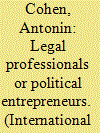

|
|
|
| 20 |
ID:
121951


|
|
|
|
|
| Publication |
2013.
|
| Summary/Abstract |
The creation of Assam as a new province in 1874 and the transfer of Sylhet from Bengal to Assam provided a new twist in the shaping of the northeastern region of India. Sylhet remained part of Assam from 1874 to 1947, which had significant consequences in this frontier locality. This paper re-examines archival sources on political mobilization, rereads relevant autobiographical texts, and reviews oral evidence to discover the 'experienced' history of the region as distinct from the 'imagined' one. The sub-text of partition (Sylhet) is more intriguing than the main text (Bengal), because events in Sylhet offer us a micro-level study. Generations of historians-writing mostly in Bengali and relying on colonial archives-have tended to overlook the mindset of the people of Sylhet. This paper, on the basis of an examination of combined sources, argues that the new province was implicated in overlapping histories, across Bengal-Assam borders. The voice of the indigenous-mostly Hindus but partly Muslim-elites were dominant from 1874 onwards. However, the underdogs-particularly 'pro-Pakistani' dalits (lower-caste Hindus) and madrasa-educated 'pro-Indian' maulvis-emerged as crucial players in the referendum of 1947. Hardly any serious study, however, has focused on the Sylhet referendum-a defining moment in the region. This study of the Sylhet referendum will reveal a new dimension to the multiple responses to these issues and provide a glimpse of the 'communal psyche' of the people in this frontier district, rather than a binary opposition between 'religious' and 'secular' forces.
|
|
|
|
|
|
|
|
|
|
|
|
|
|
|
|
|
|
|
|
|